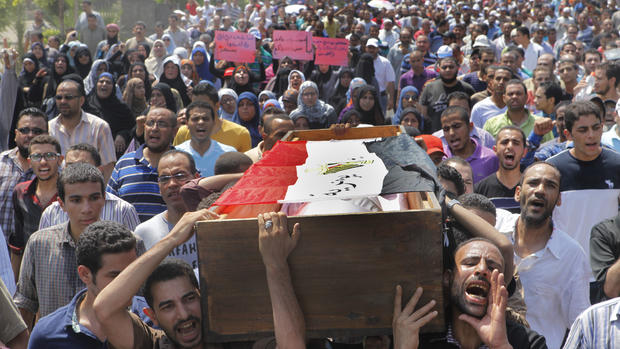Egypt extends emergency law, citing security concerns
CAIRO The Egyptian government extended the country's state of emergency Thursday, according to the office of interim President Adly Mansour.
"In light of the security situation and after the acceptance of the government, it has been decided to extend [the state of emergency] for two months," presidential spokesman Ihab Bedawi told CBS News in a phone interview. "The reason behind it is the latest terrorist activities."
Emergency law has been in effect for nearly a month following the bloody crackdown on encampments of ousted President Mohammed Morsi Aug. 14 and allows the government sweeping powers of arrest.
Bedawi told CBS News that the state of emergency was formally extended at 4 p.m. in Cairo time (10 a.m. ET) Thursday.
Cairo and a number of other cities continue to face curfew hours overnight. "The curfew stays as is," said Bedawi, noting that the decision to lift it is "taken only after consulting with the security forces."
Curfew and emergency law are part of a number of extraordinary measures the new government has implemented since Morsi was deposed July 3.
Military troops, tanks and armored personnel carriers remain deployed on the streets. Cairo and a number of other cities are still under a nighttime curfew, and the authorities have raided and shut down multiple media outlets critical of the government.
The worry is that this temporary state of emergency may be just the beginning. The last one under Hosni Mubarak lasted for decades; when crowds took to the streets in the uprising of 2011, the repeal of emergency law was a central demand.
In a recent report, Human Rights Watch said that a state of emergency "sends precisely the wrong signal" to security forces, who will "read it as license for additional reckless and unlawful use of force, particularly given the long history of abuses carried out under states of emergency in Egypt."
But the new interim government says it needs extraordinary measures to fight what it's calling a war on terrorism. Authorities claim that Muslim Brotherhood and other more radical Islamist political groups are behind attacks on security personnel, institutions and Coptic Christian churches. The Muslim Brotherhood has strenuously denied these allegations.
Meanwhile, the violence continues. Egypt has witnessed a wave of attacks against government and military forces over the past month, including last week's failed assassination attempt on Interior Minister Mohammed Ibrahim in a Cairo suburb.
The attacks are at their worst in the Northern Sinai Peninsula, where militants and security personnel have been battling nearly every day since Morsi's ouster. One attack Wednesday on a military intelligence facility in the city of Rafah left seven army personnel dead and 17 wounded, according to a statement by the military's spokesman.
These attacks escalated after the government moved against the pro-Morsi encampments last month. The interim government argued that those sit-ins were sites of violent, armed activity and that the authorities had no choice but to use force to break them up.
But Human Rights Watch has said that the security forces employed a "rapid and massive use of lethal force," terming the crackdown "the most serious incident of mass unlawful killings in modern Egyptian history."
The dispersal of those sit-ins left hundreds dead and thousands wounded, according to the official government toll; rights organizations and the pro-Morsi camp argue that the real numbers are much higher.
With continued extraordinary measures from the authorities and attacks from the militants, ordinary citizens sit in their homes during curfew hours wondering what comes next.
